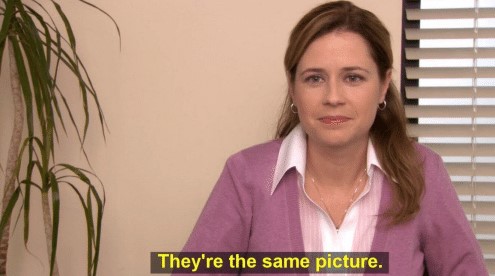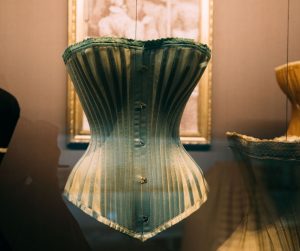Be honest, when you look at these two photos, which one do you perceive as more ‘skilled’ or ‘professional’?


No, we aren’t trying to trick you. But the truth is, there is no difference other than their clothing. These are both stock photos with absolutely no context. If you answered the woman on the right, you might just be using your societal biases unconsciously when it comes to perception. I mean, she’s literally in the middle of nowhere in that photo, can she even have Wi-Fi? Okay, enough of the jokes. If you answered the left, it’s probably also a bias. If you answered neither, well good job…but you should still read this anyway…

This week on her show, Amerykah Jones talked about how Women are still suffering for fashion.
 When we say ‘still’ if we look back in history, women’s fashion has historically been uncomfortable, and oftentimes – unsafe. While the goal isn’t to give you an entire history lesson, we will bring up one example: The corset… Ah yes! The corset gives a women’s body the “perfect” hourglass shape and improves posture. “Corsets were laced so tight that they caused constipation, indigestion, internal bleeding, and fainting from the pressure placed upon the lungs. In the worst-case scenario, the complications that resulted from wearing a corset led to death.” – National Geographic. While there is mixed information on whether or not the corset caused death or health conditions, they were still extremely uncomfortable and women had to wear them. We should also mention, this was during the Victorian Era, mid to late 1800s. It’s been over a century, and while we still have corsets, it’s not a part of an everyday ‘expected’ fashion like it was during the Victorian Era. That being said, why are women still suffering from fashion? How do we continue to evolve?
When we say ‘still’ if we look back in history, women’s fashion has historically been uncomfortable, and oftentimes – unsafe. While the goal isn’t to give you an entire history lesson, we will bring up one example: The corset… Ah yes! The corset gives a women’s body the “perfect” hourglass shape and improves posture. “Corsets were laced so tight that they caused constipation, indigestion, internal bleeding, and fainting from the pressure placed upon the lungs. In the worst-case scenario, the complications that resulted from wearing a corset led to death.” – National Geographic. While there is mixed information on whether or not the corset caused death or health conditions, they were still extremely uncomfortable and women had to wear them. We should also mention, this was during the Victorian Era, mid to late 1800s. It’s been over a century, and while we still have corsets, it’s not a part of an everyday ‘expected’ fashion like it was during the Victorian Era. That being said, why are women still suffering from fashion? How do we continue to evolve?
A study was done and researchers found that women are up to 12 times more likely than men to wear uncomfortable shoes. Women were also significantly more likely to wear items that distracted them, required ongoing monitoring and adjusting throughout the day. Study author Renee Engeln, a professor of psychology at Northwestern University in the US, said: “I think there are trade-offs. At times, uncomfortable clothing could make a woman be perceived as more attractive, professional or powerful.” This goes deeper into what traditional ‘attractiveness’ means and how exactly that contributes to our perception based on a woman’s clothing. Oftentimes, women themselves will wear clothes in order to make themselves feel more powerful, attractive, or professional. It can lift someone’s mood to have clothing to make them feel good about themselves. So what’s the balance? Some women like sweatpants and some women like tights and a skirt, what a woman wears should not define how she is perceived, however; we are incredibly influenced by our ‘pre-programmed’ perceptions based on the society we live in.
(OPINION) from Nikki Giron: I personally feel really powerful when I wear heels, however; they are really uncomfortable. I don’t feel I should have to suffer in order to be perceived a certain way. I do believe there is a balance between being dressing for yourself and dressing ‘to impress’. I’m not going to go to a job interview in sweat pants, but I also should not feel obligated to wear heels and uncomfortable clothing in order to express my professionalism and skillset. This is why I feel blind interviews will be beneficial sometimes. What if somebody can’t wear heels? Am I going to get the job instead of them because I’m wearing heels? There’s a question of fairness that comes into play to me.
In school, I learned that many times, tall people are psychologically perceived to be more ‘powerful’ because they were taller. I can’t pretend that being 5 feet fall 0 inches, that this information didn’t hurt my feelings a bit. Knowing that this is something that happens subconsciously makes me wonder if I ever missed out on an opportunity because of somebody’s unconscious bias on short people. It sounds silly, but seriously… what if? I do believe in dressing ‘nice’ for certain occasions but it shouldn’t be at the cost of me not being able to breathe or feeling like I can’t do my job because I am incredibly uncomfortable. Don’t get me wrong, I LOVE fashion and I LOVE heels but I shouldn’t have to wear something that is uncomfortable for me in order to be taken seriously.
Moving forward, we ask you to check these unconscious societal biases you may have, ‘Check Yourself Before You Wreck Yourself‘… when it comes to women’s fashion… The more we push against the grain, the more we are aware of how society can shape the way we perceive people. Heels do not equal ‘attractiveness’ or ‘professionalism’. Every woman has the right to choose the clothing they feel confident and comfortable in, and every woman has the right to choose the clothing that makes them feel good, even if it might be a tad bit uncomfortable for them. What truly matters is the why. Women should not be suffering for fashion and positive perception.
Sources:
Little, Becky. “Killer Clothing Was All the Rage In the 19th Century.” National Geographic, 17 Oct, 2016, https://www.nationalgeographic.com/culture/article/dress-hat-fashion-clothing-mercury-arsenic-poison-history
Freeman, Maria. “Uncomfortable clothing could make a woman be perceived as more attractive’: Women are 12 times more likely than men to suffer for fashion, study finds.” Daily Mail UK. 7 Jan. 2022,
https://www.dailymail.co.uk/news/article-10380553/Women-12-times-likely-men-suffer-fashion-study-finds.html